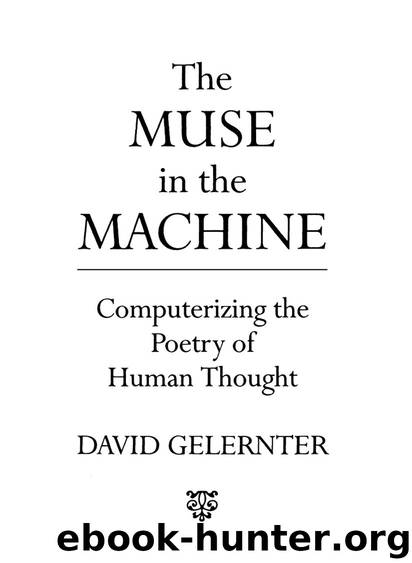The Muse in the Machine by David Gelernter

Author:David Gelernter
Language: eng
Format: epub
Publisher: The Free Press
Published: 1994-07-15T00:00:00+00:00
Chapter Six
The Spectrum on a Computer?
Claim: I can demonstrate to you that there is (at the moment) no such thing as a “thinking machine” just on the basis of common language, with no reference to computer science at all.
We hear the term “thinking machine” or “thinking computer” from time to time, and it glows with high-tech panache. In fact there is a computer company in Massachusetts that has named itself “Thinking Machines” exactly to emphasize its cutting-edgeness. But I’d conjecture that, if thinking machines really existed, the term “thinking machine” would itself be obsolete. At best, it would have a quaintly archaic ring—
After all, a real thinking machine would be useful and valuable to a nearly inconceivable degree. Imagine a dozen things you care about, and imagine setting “employees” to work thinking about them non-stop twenty-four hours a day, employees who enjoy immediate access to gigantic databases (information in huge quantities is pumped directly into their brains), never make sloppy mistakes and never get bored. You’d have full-time accounting, medical, legal, financial, and so forth staffs looking after your interests round the clock.
A machine that useful wouldn’t even be a machine; wouldn’t be a mere computer; it would be something else. By the same token, a horseless carriage proved to be so much more useful and valuable than any other kind that it really wasn’t a carriage at all, when you got right down to it.
When and if such machines emerge, the term “thinking machine” or “thinking computer” will pack about as much technological pizzazz as “flying machine,” “talking machine” and so on.
A thinking computer would be useful, to say the least. Such a contraption would also tell us a great deal about human thought. To the extent you can make it work you have proven that, if your mind mechanism is not the way in which thought happens—at least it’s a way. And that would be an exceptionally interesting piece of news.
My goal in this chapter is to explain why the idea of software as a metaphor for mind is so seductive, and why it is wrong. To do this, I need to start by explaining briefly what software is and what the phrase “virtual machine” means. (Basically “virtual machine” means “software,” but the longer phrase emphasizes certain aspects of software.)
But first, who cares about the metaphor? Why invest time explaining and attempting to demolish it?
For one, just because this metaphor is such a widely held article of faith in cognitive science. But there are more important and more substantive issues at stake too. The software metaphor underlines and reinforces the field’s most basic and damaging bias—to be aware only of the highest-focus sliver of the cognitive spectrum, and to mistake this abstract, logical, analytic sliver for the whole of thought. Spirituality, to pick only the most extreme example, is unlikely to recommend itself as a serious thought science research topic so long as “mind” and “software” can possibly be confused. Not only is the metaphor wrong, but its wrongness has had bad consequences for the field.
Download
This site does not store any files on its server. We only index and link to content provided by other sites. Please contact the content providers to delete copyright contents if any and email us, we'll remove relevant links or contents immediately.
| Computer Vision & Pattern Recognition | Expert Systems |
| Intelligence & Semantics | Machine Theory |
| Natural Language Processing | Neural Networks |
Algorithms of the Intelligent Web by Haralambos Marmanis;Dmitry Babenko(17650)
Jquery UI in Action : Master the concepts Of Jquery UI: A Step By Step Approach by ANMOL GOYAL(10069)
Test-Driven Development with Java by Alan Mellor(7752)
Data Augmentation with Python by Duc Haba(7626)
Principles of Data Fabric by Sonia Mezzetta(7402)
Learn Blender Simulations the Right Way by Stephen Pearson(7308)
Microservices with Spring Boot 3 and Spring Cloud by Magnus Larsson(7156)
Hadoop in Practice by Alex Holmes(6701)
RPA Solution Architect's Handbook by Sachin Sahgal(6533)
The Infinite Retina by Robert Scoble Irena Cronin(6239)
Big Data Analysis with Python by Ivan Marin(5959)
Life 3.0: Being Human in the Age of Artificial Intelligence by Tegmark Max(5541)
Pretrain Vision and Large Language Models in Python by Emily Webber(4915)
Infrastructure as Code for Beginners by Russ McKendrick(4676)
Functional Programming in JavaScript by Mantyla Dan(4512)
WordPress Plugin Development Cookbook by Yannick Lefebvre(4411)
The Age of Surveillance Capitalism by Shoshana Zuboff(4273)
Embracing Microservices Design by Ovais Mehboob Ahmed Khan Nabil Siddiqui and Timothy Oleson(4167)
Applied Machine Learning for Healthcare and Life Sciences Using AWS by Ujjwal Ratan(4156)
